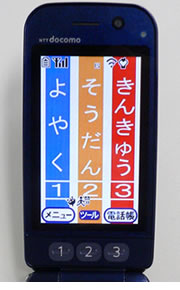Tokyo, August 19, 2010
Fujitsu and the town of Shiraoi, Hokkaido Prefecture, today announced that they have jointly built a regional contact center system that provides mobile phone-based support services for seniors. This system, which uses the Fujitsu Raku-Raku mobile phone, will begin operation August 23, 2010.
As part of the service, 60 Raku-Raku mobile phones will be distributed to seniors living alone, allowing them to contact local support volunteers or emergency services through a single press of a button. The phone's built-in pedometer can log the user's physical activities and provide activity reports automatically, while the GPS sensor can provide user's location data. These features will help ensure that seniors in Shiraoi enjoy greater safety and security at all times.
Fujitsu views this as one of a series of community projects with the aim of alleviating social problems by creating new social infrastructures based on the integration of computers in everyday life.
Background
 Raku-Raku Phone used in senior support service
Raku-Raku Phone used in senior support serviceAs of July 2010, the senior population in Shiraoi made up 33% of the town's population, already surpassing the forecast nationwide rate for the year 2025, which is 30.5%. With roughly one in six seniors requiring some form of care or assistance, the town had an increasing need for a program that would help support the area's senior population more effectively. With roughly 1,750 households consisting of people aged 65 or above living alone, the town especially needed a lifestyle-support program that could provide regular safety checks for seniors.
In collaboration with Fujitsu, Shiraoi is launching a mobile phone-based support program for seniors. As a central part of the program, 60 Fujitsu Raku-Raku mobile phones will be distributed to local residents, mostly seniors living alone, and a regional contact center system will be in operation to provide regular safety checks, shopping assistance, as well as other services for seniors. The mobiles phones are equipped with three types of special buttons: reservation, consultation, and emergency. A single push of one of these buttons can put seniors in touch with local support volunteers, reporting their location data, as well as notifying emergency services. Data from the phone pedometer will be automatically transmitted to the contact center daily, making it possible to detect irregularities, such as a lack of movement. If an irregularity is detected, the user's location data will be transmitted to emergency services automatically through the GPS sensor.
This new service will be a meaningful step towards Fujitsu's long-term goal, which is to create a "Human Centric Intelligent Society." The unified communication system(1) utilized in this program, which is jointly developed by Fujitsu Limited and Fujitsu Research Institute, will enable safety checks and lifestyle support, such as shopping assistance, for seniors throughout the Shiraoi area.
In the future, Shiraoi will be looking into expanding the scope of the program beyond seniors, to make living more convenient for all local residents and to invigorate social life in the area.
Fujitsu plans to offer this service as part of its home care assistance program in the future.
Contact-Center System Features
The contact center operates as a virtual call center. Instead of operators standing by at a fixed location, calls are redirected to support volunteers' personal phones, whose numbers have been pre-registered in the system. This enables Shiraoi's support team to provide assistance without being constrained in terms of time or location, thereby reducing their workloads. It also dispenses with the capital costs that would be associated with building a conventional call center.
The contact center's response server can accept incoming information in the forms of phone calls from registered mobile phones, e-mail, or sensor data, and pass the information along to local support volunteers or emergency services automatically.
